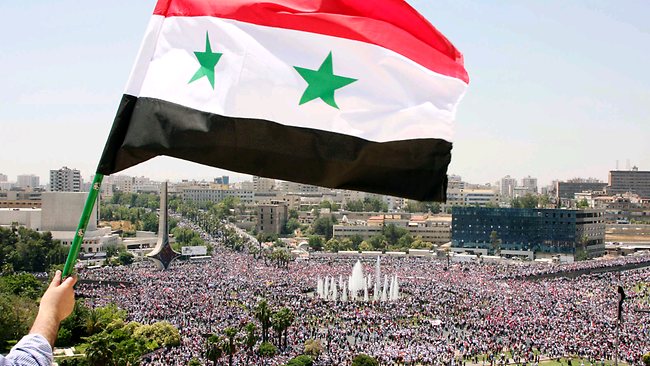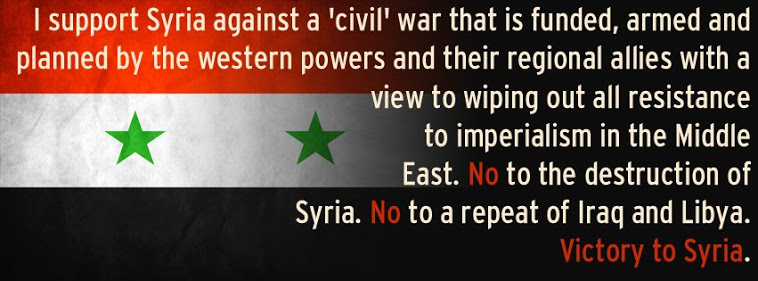SYRIA | The Foreign and Expatriates Ministry says it SO WELL
Syria expresses regret at some countries' insistence to adopt a wrong approach in terms of seeking to refer the situation in Syria to the International Criminal Court (ICC), said the Foreign and Expatriates Ministry in a letter it addressed on Friday to the Chairman of the UN Security Council.
The Ministry's letter came in response to a move taken by a number of countries by which they submitted a joint letter to the Security Council on referring the situation in Syria to the ICC in the framework of their claims of concern about the humanitarian situation in Syria and on efforts to bringing human rights violations to a halt.
The Ministry stressed in its letter that the Syrian government shares those countries' concern over the developments of humanitarian situation in Syria and the human rights violations committed by the armed terrorist groups.
It underscored that these developments and violations "constitute a large departure from the state of stability, security and freedom of religion and belief which Syria and the Syrians used to enjoy before the crisis."
"The Syrian government voices regret over those countries' insistence on adopting a wrong approach that rejects to acknowledge the Syrian state's duty in protecting its people from the terrorism imposed on it from the outside," the Ministry's letter said.
It highlighted that the funding, training and harbouring provided to the armed terrorist groups from certain countries, some of them are signatories of the joint letter, are no longer a secret.
It added that these forms of support to the terrorist groups have been provided a cover in the form of political and media campaigns that seek to protect the crimes of these groups and do harm to the Syrian state through accusing it of committing those crimes.
The Foreign and Expatriates Ministry also expressed regret that a country like Switzerland, in which the main agreements of the international humanitarian law are confided and which was known for its neutrality and objectivity, would lead this unfair and misleading campaign against a country who is a member of the UN and defend the terrorist groups' practices.
The Ministry reviewed in its letter the national efforts and mechanisms of accountability which it said were the subject of a number of letter it addressed to the Chairman of the Security Council and the UN Secretary General at earlier times.
It clarified that Syria has formed an honest, independent and reliable national committee to investigate all complaints regarding human rights violations committed by civilians or military members, noting that subcommittees have been formed in all the provinces.
The investigation committee, the Ministry added, has referred the largest part of cases to the concerned courts to be looked into, while a number of complaints left are still under investigation.
Accordingly, a number of people involved in acts incompatible with their job duties have actually been referred to courts, the letter continued.
The Ministry stressed that therefore the national efforts are not used up as a first and essential prelude before taking any steps towards references to international bodies.
It pointed out that the move of those countries that are signatories of the joint letter "stresses once again their practice of hypocrisy and double standards regarding the crisis in Syria and the international human rights laws in general."
"While they voice their concern for the Syrian people and about the international humanitarian law and the international human rights law, they ignore the political, media, logistic and military support provided to the armed groups," the Ministry said.
It went on as saying that some of the signatories provide direct support in terms of money and weapons to the terrorist groups to commit acts that breach the international law and the international human rights law.
"Those signatory countries also hinder the Syrian national dialogue and the efforts seeking a peaceful solution to the crisis based on the political program proposed by President Bashar al-Assad on January 6th, which we handed you a copy of few days after its announcement," the Ministry added.
"If the intentions of those signatory countries are really honest regarding ending the humanitarian suffering of the Syrians and bringing the human rights violations in Syria to a halt, then the right way to do this doesn't pass through escalatory and instigative moves that pour oil on the fire," the Foreign and Expatriates Ministry' letter said.
"The right way to do so," it added, "passes through the following:
First: Exerting pressures on the countries which are funding, sheltering, training and sending terrorists to Syria to practice their terrorism against the Syrians, as those seek to destroy the unique Syrian social fabric characterized by co-existence and work systematically to destroy the infrastructure and ruin the national economy in addition to stealing food, medicines and fuel to deprive the citizens of these essential materials and selling them in the way of the war traders.
Second: Exerting pressures on issuers of 'fatwas' who provide the excuses for killing, abducting and torturing the Syrians and destroying and looting their properties and convince those who commit these barbarous practices that these practice come under 'jihad' for which the perpetrators will be rewarded by entering Paradise and will not be exposed to accountability according to the international law.
Third: Lifting the illegal and immoral unilateral sanctions imposed on Syria as they constitute collective sanctions against the Syrian people and have had a direct role in the aggravation of the humanitarian situation in Syria and the violation of the Syrians' rights, particularly in terms of depriving them of the major life requirements, including fuel, food and medicines, with these sanctions' negative impacts even reaching the relief efforts being carried out by the UN. These sanctions constitute a flagrant violation of the international human rights law and the relevant UN resolutions.
Fourth: Working seriously on halting the flow of weapons to the armed terrorist groups, which some of them are manufactured in a number of the countries which are signatories to the joint letter, while other signatory countries send gunmen to Syria to kill and terrorize the Syrians.
The killing machine undertaken by the armed groups and takfiri gunmen in Syria, who film the acts which they commit and circulate the photos as widely as possible via the internet and take pride in this, would not have happened had it not been for the weapons made available for it and for the media and political coverage provided to it by several countries.
"The move in the direction sought by those signatories won't contribute to ending the humanitarian suffering or halting the violations of the international humanitarian law and international human rights law committed by the armed terrorist groups," the Foreign and Expatriates Ministry asserted.
Rather, the Ministry added, these groups would find in this move a form of support for them and for their practices as well as more legitimacy for further killing and destruction.
The Foreign and Expatriates Ministry concluded by stressing the need to remind the signatory countries of what they should do in terms of supporting the international efforts that are aimed at solving the crisis politically through national dialogue that restores security and stability to the Syrians and realizes their aspirations by peaceful means, instead of complicating things in a way that is not in the interest of bringing an end to the crisis.
Source: SANA
http://www.sana-syria.com/eng/21/2013/01/18/462534.htm
Patreon
Search This Blog
Tweet of the Day
At This Point We Have To Always Assume Israel Is Lying Until Proven Otherwise
— Caitlin Johnstone (@caitoz) December 22, 2023
"At this point the default assumption of any thinking person should be that all claims made by Israel are lies until proven otherwise by mountains of rock-solid evidence."https://t.co/tto1YyZ4RE
HANDS OFF SYRIA

Most Read
Video of the Month
Syria | After the Earthquake..
.
Video of the Week
Syria | Aerial views show the volume of destruction from the earthquake that hit Aleppo..
Find Articles by Keywords
- Syria 520
- ISIS 75
- al-Qaeda 53
- US 44
- Bashar al-Assad 42
- Iraq 38
- Terrorism 37
- Israel 36
- interview 32
- ISIL 30
- UN 29
- RUSSIA 28
- War 28
- Saudi Arabia 27
- CHEMICAL ATTACK 23
- ALEPPO 20
- OPCW 20
- SARIN 20
- SYRIAN PRESIDENT 18
- Qatar 17
- SYRIAN REBELS 16
- al-Nusra Front 14
- AL-ASSAD 13
- Damascus 13
- Seymour Hersh 12
- Erdogan 11
- MUSLIM BROTHERHOOD 11
- President Bashar al-Assad 10
- Bashar al-Assad interview 9
- Sharmine Narwani 9
- BBC 8
- HOS 8
- Middle East 8
- Regime Change 8
- Vladimir Putin 8
- false flag 8
- Ghouta 7
- Islamists 7
- Khan Sheikhoun 7
- Sanctions 7
- Trump 7
- White Helmets 7
- Wikileaks 7
- Aisling Byrne 6
- Brandon Turbeville 6
- Christians 6
- Eva Bartlett 6
- Hands OFF Syria 6
- Tony Cartalucci 6
- Deir Ezzor 5
- Richard Black 5
- Robert Fisk 5
- Tim Anderson 5
- al-Jaafari 5
- Bashar al-Jaafari 4
- Latakia 4
- Lebanon 4
- Rick Sterling 4
- Vanessa Beeley 4
- War crimes 4
- al-Moallem 4
- Al-Jazeera 3
- Alawites 3
- Amnesty International 3
- Arab Spring 3
- Caesar 3
- Dr Bashar al-Jaafari 3
- Eastern Ghouta 3
- Genocide 3
- Homs 3
- Human Rights Watch 3
- Jonathan Steele 3
- Takfiris 3
- Thierry Meyssan 3
- ahrar al-sham 3
- Caesar Photos 2
- Caesar Torture Photos 2
- Carla Del Ponte 2
- Dennis J. Kucinich 2
- Jeremy Salt 2
- Mother Agnes Mariam 2
- Muslim Brotherhood Project 2
- Prof Tim Anderson 2
- Caesar Photo Fraud 1
- ISIS-Turkey 1
- Matt VanDyke 1
- The WikiLeak Files 1
- Theodore A. Postol 1
- Timothy Bancroft-Hinchey 1
- Valdai speech 2016 1
- Wag the dog 1
Seymour Hersh
3/Seymour Hersh/post-list
Tweet of the Week
Defend this, Israel simps. Come into my replies and defend this. I genuinely want to see how you defend this horror. What's it going to be? Blame Hamas for not obeying Israel's demands? Claim these hundreds of thousands of civilians deserve to starve to death? Lay it on me. https://t.co/9BQ68fmk20
— Caitlin Johnstone (@caitoz) December 22, 2023
Recent Posts
3/random/post-list
Sanctions
3/Sanctions/post-list
Menu Footer Widget
Copyright ©
Hands OFF Syria












0 Comments